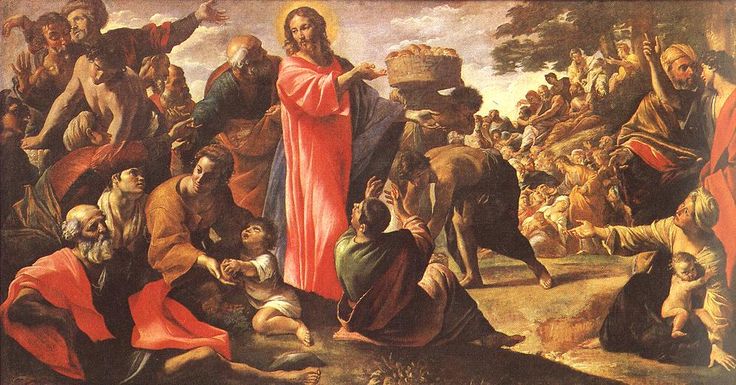Doubting Jehovah Jireh
Mark 6:32-44 — 32 And they went away in the boat to a desolate place by themselves. 33 Now many saw them going and recognized them, and they ran there on foot from all the towns and got there ahead of them. 34 When he went ashore he saw a great crowd, and he had compassion on them, because they were like sheep without a shepherd. And he began to teach them many things. 35 And when it grew late, his disciples came to him and said, “This is a desolate place, and the hour is now late. 36 Send them away to go into the surrounding countryside and villages and buy themselves something to eat.” 37 But he answered them, “You give them something to eat.” And they said to him, “Shall we go and buy two hundred denarii worth of bread and give it to them to eat?” 38 And he said to them, “How many loaves do you have? Go and see.” And when they had found out, they said,“Five, and two fish.” 39 Then he commanded them all to sit down in groups on the green grass. 40 So they sat down in groups, by hundreds and by fifties. 41 And taking the five loaves and the two fish he looked up to heaven and said a blessing and broke the loaves and gave them to the disciples to set before the people. And he divided the two fish among them all. 42 And they all ate and were satisfied. 43 And they took up twelve baskets full of broken pieces and of the fish. 44 And those who ate the loaves were five thousand men.
Numbers 11:1-15 — 1 And the people complained in the hearing of the Lord about their misfortunes, and when the Lord heard it, his anger was kindled, and the fire of the Lord burned among them and consumed some outlying parts of the camp. 2 Then the people cried out to Moses, and Moses prayed to the Lord, and the fire died down. 3 So the name of that place was called Taberah, because the fire of the Lord burned among them.
4 Now the rabble that was among them had a strong craving. And the people of Israel also wept again and said, “Oh that we had meat to eat! 5 We remember the fish we ate in Egypt that cost nothing, the cucumbers, the melons, the leeks, the onions, and the garlic. 6 But now our strength is dried up, and there is nothing at all but this manna to look at.”
7 Now the manna was like coriander seed, and its appearance like that of bdellium. 8 The people went about and gathered it and ground it in handmills or beat it in mortars and boiled it in pots and made cakes of it. And the taste of it was like the taste of cakes baked with oil. 9 When the dew fell upon the camp in the night, the manna fell with it.
10 Moses heard the people weeping throughout their clans, everyone at the door of his tent. And the anger of the Lord blazed hotly, and Moses was displeased.11 Moses said to the Lord, “Why have you dealt ill with your servant? And why have I not found favor in your sight, that you lay the burden of all this people on me? 12 Did I conceive all this people? Did I give them birth, that you should say to me, ‘Carry them in your bosom, as a nurse carries a nursing child,’ to the land that you swore to give their fathers? 13 Where am I to get meat to give to all this people? For they weep before me and say, ‘Give us meat, that we may eat.’ 14 I am not able to carry all this people alone; the burden is too heavy for me. 15 If you will treat me like this, kill me at once, if I find favor in your sight, that I may not see my wretchedness.”
So if we were to compare the disciples with an entity in this story from Numbers 11, who would it be?—the complaining, unbelieving, God-rejecting people of Israel. The ones who had seen the greatest miracles from the hand of God—the 10 plagues, the parting of the Red Sea, the water gushing from a rock—were the same ones who complained about and disbelieved in his capability to provide. Likewise, there is no one here in this room who couldn’t attest to many, mighty examples of the Lord’s provision in their lives. Regardless of those examples of God’s goodness, we still often do not consider him trustworthy enough to give us what we need. We’re just not convinced he really has our best in mind or we aren’t convinced he can make it happen even if he does, because of Satan and all the wickedness in the world of course. So what do we do? We turn our back on the clear things that he has commanded and try to make things happen on our own. In essence, we tell God how things need to get done. OR…we feel we must worry about certain things because if we can just determine how it’s all going to work out, then we can have peace. These are substitutes for faith and evidences of rejecting God. We must understand that we will reap what we sow. If we sow unbelief, we will never reap the fruit of the Spirit in our lives. In fact, when we disbelieve, we treat the word of the Lord as ridiculous just as the disciples did in this text.

